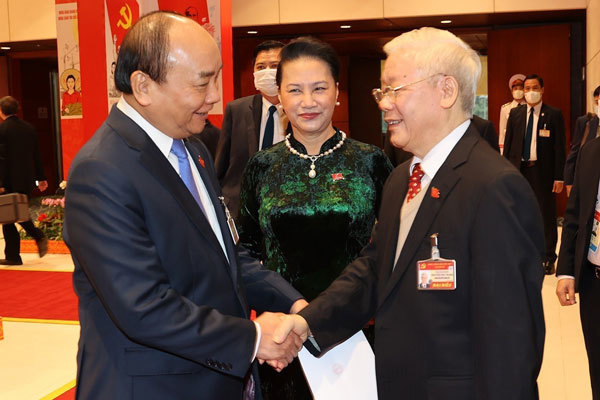Macro-foundations
In his remarks at the opening session of the 13th National Party Congress, General Secretary and President Nguyen Phu Trong three times mentioned the requirement of "stabilizing macroeconomics" as one of the major policies to operate the economy in the next 5, 10 years.
He said: “Continue to accelerate and effectively implement the restructuring of the state budget, manage public debt safely; restructure public investment, credit institutions and state-owned enterprises; ensure macroeconomic stability."
 |
|
Macroeconomic stability and inflation control are still the top priority policies in the next development period. Photo: VNA
|
Prime Minister Nguyen Xuan Phuc, who always asks for macroeconomic stability, understands the value of this foundation better than anyone else. Speaking at the last National Assembly session, he proudly said that, with the determination of the entire political system, the consensus of the people and businesses, Vietnamese together created more than $1.2 trillion of GDP within nearly 5 years on "a stable macroeconomic foundation".
“We need to continue to maintain a stable macroeconomic foundation, consistently control inflation at a low level of less than 4% and ensure great balances of the economy. Vietnam strives to be always a dynamic, creative, fast-growing but stable and sustainable economy, so don't let the macro foundations that we have been working hard to build to be eroded,” said the Prime Minister.
If the macro economy is stable, the value of the Vietnam dong is maintained, inflation is low... then a solid foundation for the trust of the people and businesses is created, so they spend money to invest in business and help develop the national economy.
Lessons from the past
“The positive results from the restructuring of the state budget and public debt have created an important room for fiscal policy, so in 2020, despite difficulties caused by serious impacts of natural disasters and epidemics, and budget revenue decline, we still proactively handled emerging problems, and actively supported businesses, people and the economy,” said Finance Minister Dinh Tien Dung.
The socio-economic report of the 12th Party Congress in 2016 summarized: “Controlling inflation and ensuring major balances of the economy is not really sustainable; balance of the state budget is still difficult; budget expenditure structure is unsuitable; recurrent expenditure increases rapidly; budget deficit is still high, not reaching the target of reducing to 4.5% of GDP."
In this situation, in November 2016, General Secretary Nguyen Phu Trong signed Resolution 07 of the Politburo on restructuring the state budget and managing public debt to ensure a safe and sustainable national finance.
In order to concretize that policy, in November 2016, National Assembly Chairwoman Nguyen Thi Kim Ngan issued Resolution 25 on the national financial plan for the 2016-2020 period and imposed specific targets on overspending, public debt, government debt, foreign debt...
These were the huge pressures on fiscal policy.
Public debt, overspending decrease
Speaking at the 13th National Party Congress, Finance Minister Dinh Tien Dung said that the budget deficit decreased from an average of 5.4% of GDP in the period 2011-2015 to 3.6% of GDP in the period 2016-2020, lower than the target.
 |
|
Finance Minister Dinh Tien Dung speaks at the 13th Party Congress. Photo: VNA
|
Public debt decreased from 63.7% of GDP at the end of 2016 to 55.8% of GDP by the end of 2020; the proportion of domestic loans increased from 39% in 2011 to about 63% in 2020. The average bond issuance term in 2020 was extended to nearly 14 years, compared to nine years in 2016.
In addition, the proportion of domestic revenue in total budget revenue increased from nearly 69% in the period 2011-2015 to 82% in the period 2016-2020 and reached nearly 86% in 2020 to ensure sustainability and compliance with the level of development and integration of the economy.
According to the Finance Minister, these figures contributed to saving state budget spending, ensuring national financial safety and security.
Stability for development
Dr. Tran Dinh Thien, a member of the Prime Minister's Advisory Group, commented that the macroeconomy is stable, the budget is consolidated, foreign exchange reserves increased, the banking system is stable and interest rate fell. These were the achievements accumulated in the past few years, which helped the economy be very resilient in the year of Covid-19.
Mr. Cao Viet Sinh, member of the subcommittee on socio-economic documents of the 13th Party Congress, said that the Government has closely coordinated many policies and solutions for macroeconomic stabilization, inflation control and promoting economic growth.
The average consumer price index decreased from 18.6% in 2011 to a stable level of about 4% per year in the period 2016 - 2020. He said: “The macroeconomy is more stable, inflation is controlled at a low level, the major balances of the economy are significantly improved."
Minister Dinh Tien Dung affirmed: “The key task in the next period is to continue to improve financial institutions, restructure the budget, and public debt to promote economic restructuring; step up the renewal of the public non-business sector, continue to arrange and streamline the apparatus and payrolls together with the reform and modernization of the management work; tighten finance - budget discipline; improve the resilience of the national financial system."
Tu Giang

Transport economics to drive Vietnam’s urban development
Transport projects are expected to improve overall accessibility and reduce transportation costs, in turn increase economic productivity and development.

Extensive reforms behind the border
When the Covid-19 pandemic, which started in Wuhan in China a year ago, broke out, even the most optimistic person could not imagine that the Vietnamese economy would stand firm.